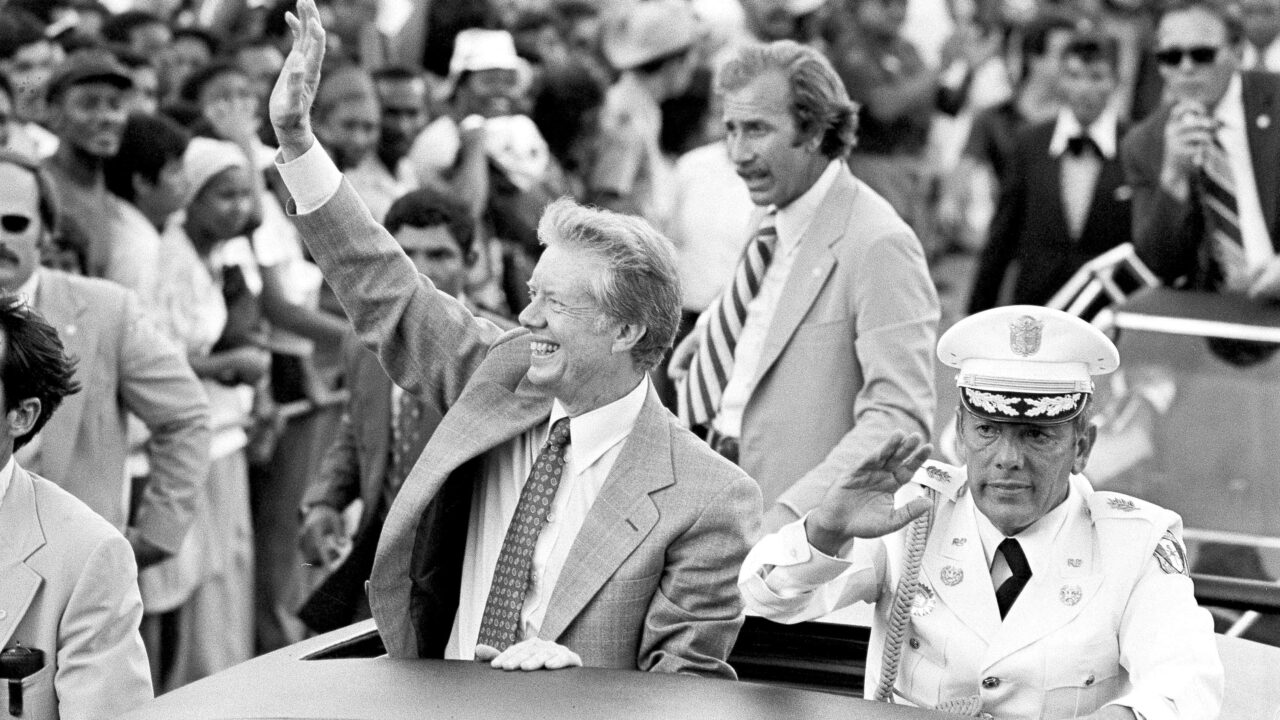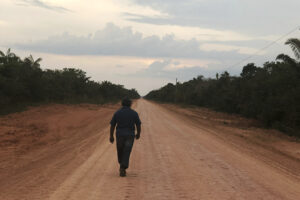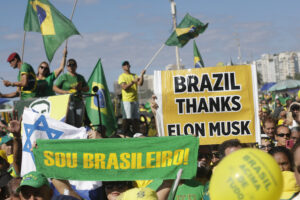Carter’s Focus on Human Rights Changed the Global South
Through policy, pressure and negotiation, the late president's effort were both immediate and, sometimes, lasting. President Jimmy Carter and Gen. Omar Torrijos wave from an open car in Panama City, Panama, on June 16, 1978. (AP Photo)
President Jimmy Carter and Gen. Omar Torrijos wave from an open car in Panama City, Panama, on June 16, 1978. (AP Photo)
In 2023, Elio Gaspari, one of the most prominent journalists in Brazil, wrote a column about Jimmy Carter, making the case that “Brazil’s democracy owes him a great deal.” Carter’s passing Sunday at age 100 means that his record as president will certainly win him similar praise elsewhere in the Global South, a fact that may come as a surprise to Americans.
Carter’s emphasis during his presidency on human rights, although often regarded as quixotic or hypocritical, had a positive impact around the world, notably in Brazil and Haiti. His successful diplomatic effort to negotiate and win Senate approval for the Panama Canal Treaty successfully removed one of the riskiest flashpoints in U.S.-Latin American relations. (Donald Trump may be about to reveal just how important that treaty was, if he persists with his ill-considered and illegal efforts to challenge it.) He also reduced the previous U.S. support for white minority regimes in southern Africa, helping clear the way for Rhodesia to become independent Zimbabwe in 1980.
There’s no need to exaggerate the Carter administration’s positive impact in the Global South. Critics rightly point out that he made mistakes, including his notorious endorsement of the repressive Shah of Iran during a 1977 state visit there. Carter toasted the shah as showing “great leadership” and thanked him for maintaining Iran as “an island of stability in one of the more troubled areas of the world” — less than a year before the country exploded in the gigantic nationwide rebellion that installed the Ayatollah Khomeini and the Islamic Republic.
But there is another positive side to Carter’s presidency. When he took office, Brazil had been under a military dictatorship for 13 years, a regime that the U.S. had originally encouraged to seize power. Gaspari’s newspaper column recalled that Carter’s emphasis on human rights quickly created “a climate of cordial antipathy” between Washington and the regime, then presided over by Gen. Ernesto Geisel. Gaspari explained further that during an official visit, Carter’s wife, Rosalynn, in addition to meeting Geisel, also pointedly spent time with two American missionaries who worked with the poor and who had been badly treated by the Brazilian police. Military rule lasted until 1985, but Carter had already signaled that it could not be eternal.
There’s no need to exaggerate the Carter administration’s positive impact in the Global South.
In Indonesia, Carter’s human rights emphasis had more immediate results. When he took office, Amnesty International reported that the Suharto dictatorship held 100,000 political prisoners, who had been arrested during the violent seizure of power in 1965, an upheaval in which as many as 1 million people had been murdered. The U.S. had endorsed Suharto’s coup and stayed quiet about the awful wave of killings that followed.
Just a month after Carter was elected, Indonesia’s security chief announced that prisoner releases would begin; all were freed by 1979. Among them was Pramoedya Ananta Toer, Indonesia’s leading writer. During Pramoedya’s first eight years in detention, the regime prevented him from writing. He started composing four historical novels anyway. He wrote them in his head — and he regularly recited his work to fellow prisoners, in the hope that some of it would survive.
I interviewed Pramoedya in 1986, in Jakarta, the Indonesian capital. He was still prevented from publishing in his own country, but at least he was no longer confined on the Buru prison island. He credited Carter’s policy with his partial freedom. He was writing again in the more conventional way, and his four historical novels and other works were starting to appear worldwide.
Another place where Carter’s human rights emphasis had an impact was in Haiti, then ruled by President-for-Life Jean-Claude “Baby Doc” Duvalier. In 1992, I met Father Freud Jean, a Catholic priest and pro-democracy activist. He got straight to the point: “The repression started to ease as soon as Carter took office.” Something had changed, even though Haitians didn’t overthrow the regime until 1986.
You could write a very different, alternate history for U.S.-Latin American relations if Carter had not pushed through the treaty that turned over the canal to Panama by 2000. The Canal Zone, de facto U.S. territory, cut Panama in two. Some 22 American military bases were located there, and all across Latin America — not just in Panama itself — the U.S. occupation was regarded as a major irritant. On Jan. 9, 1964, Panamanian students protested the continuing U.S. presence; some 22 Panamanians and four U.S. soldiers died in the confrontation. Panama commemorates the event as Martyrs’ Day.
Carter campaigned hard to win Senate approval for the treaty; he needed a two-thirds majority. The domestic constituency in the U.S. was nearly nonexistent, while the opposition — Ronald Reagan was one of its leaders — was significant. In the end, he won by a single vote.
Unfortunately, Carter’s measured policy did not extend to Central America. In El Salvador, the right-wing military/oligarchy alliance sponsored a growing number of death squads to repress the rising popular movements. But the Carter administration disregarded pleas from, among others, Archbishop Oscar Romero to stop shipping arms to the government. In February 1980, Romero wrote Carter warning that more U.S. military aid would “undoubtedly sharpen the injustice and the repression inflicted on the organized people, whose struggle has often been for respect for their most basic human rights.” A month later, a death squad murdered Romero as he said mass, and the vicious decade-long conflict was underway that would eventually claim proportionally more Salvadoran lives than the American toll of the. Civil War.
Carter’s gestures and rhetoric did have an effect, even if in some cases they were mainly only words.
Meanwhile, the national liberation war in white-minority ruled Rhodesia was escalating. The fighting, at first confined to the rural northeast, had spread across the country. I reported from there at the time. White Rhodesians were hostile as soon as they heard my American accent; Blacks routinely praised Carter’s stance. Young white soldiers had started to call Black people “floppies” — because they supposedly flopped when you shot them, and a Black guerrilla commander I met later said that the regime’s soldiers routinely hanged liberation army soldiers they had captured.
The previous Nixon/Henry Kissinger administration had relaxed the minimal U.S. pressure against Rhodesia and South Africa. Carter reversed the policy and helped push Britain into sponsoring the February 1980 elections that ended the war and brought the two liberation movements to power after they won a landslide victory. Since then, the independent Zimbabwe governments have disappointed the majority of their own citizens (and others), but 20,000 people had already been killed in the liberation war. Without the change in U.S. policy, the war would have gotten considerably worse.
As Carter passes from the scene, no doubt other positive reports of his impact in the Global South will appear. One common feature is that Carter’s gestures and rhetoric did have an effect, even if in some cases they were mainly words. The U.S. president was and remains powerful. In a more just world, he or she would not be able to alter events with a modest change of tone. But we are not there yet.
Your support is crucial...As we navigate an uncertain 2025, with a new administration questioning press freedoms, the risks are clear: our ability to report freely is under threat.
Your tax-deductible donation enables us to dig deeper, delivering fearless investigative reporting and analysis that exposes the reality beneath the headlines — without compromise.
Now is the time to take action. Stand with our courageous journalists. Donate today to protect a free press, uphold democracy and uncover the stories that need to be told.






You need to be a supporter to comment.
There are currently no responses to this article.
Be the first to respond.